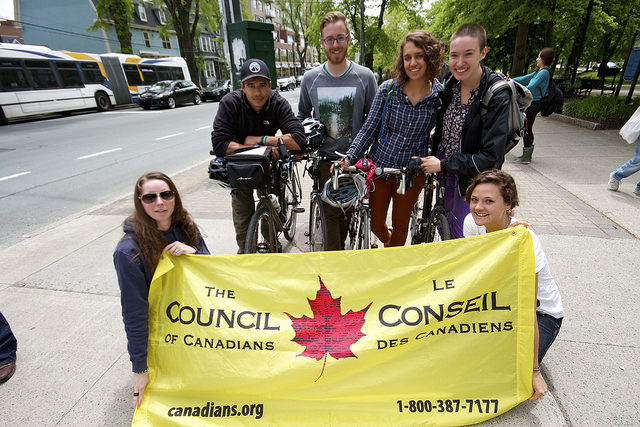A march without borders
We met for the first time in a coffee shop on Wellington to share stories of the road. We had plenty in common. This summer, unaware of each other’s existence, the two of us cycled to Ottawa from opposite coasts of Canada. Joseph, alone on a unicycle from B.C.; Alex, on two wheels and coordinating a team of four that started in Nova Scotia.
Both journeys were undertaken with a greater purpose. Our respective goals were to create political unity and action to address climate change, and to engage in critical discussion with communities along the proposed Energy East pipeline.
Among other similarities, we realized that neither of our trips were purely Canadian. Half of Alex’s team was American and Joseph’s route took him through the U.S. under Lake Superior. We exchanged thoughts on how the climate justice movement is transcending borders. With this experience behind us, it didn’t seem odd to discover that people across Canada are buzzing with excitement about a march that took place in New York City this weekend.
In fact, on Saturday morning, like thousands of others, we boarded the same bus to Manhattan, where enthusiastic Canadians joined hundreds of thousands from across North America and the world for the People’s Climate March.
In the café, we talk about the sheer breadth and scope of the as-yet-uncovered stories of our fellow marchers, the common threads we expected to unwind, the shared struggles that we all encountered while feeling through the dark in this quest for a more just and sustainable future.
Lead among these struggles is the need to push past assumptions and judgements about strangers, in order to find the common humanity we share with the people we encounter. We both found ourselves changing our tone – consciously or otherwise – as we ventured into regions where our traditional “anti-tar sands expansion” gospel didn’t resonate. We did this to avoid conflict or to defend ourselves from judgment, yet embraced the ability of toned-down rhetoric and genuine conversation to foster meaningful dialogue with people we never would have connected with otherwise.
We both had stories of handshakes, well wishes, and donations from “proponents” of the same industries we resist. These conversations, we agree, are perhaps the most valuable – the ones that go beyond the “agree to disagree” mentality to one of deeper understanding, mutual respect, and perpetual consideration of the complexity of our mission. We recognized that this ability to talk frankly and honestly from our hearts is also empowered by our status as grassroots activists and not institutional evangelists.
It’s the same reason we knew that the climate march in New York would be the largest and most profound in the history of the climate movement. At its heart, this march was about breaking down barriers. We are creating cross-border people power. We are building new channels of communication with people and groups we never would have expected to be part of this march. By putting our bodies on the streets, we are generating the political will to take action on climate change.
This march was a turning point in the struggle for climate justice because it showcased the growing unity of communities that have rarely been seen on the same side. Indigenous communities who are resisting the fossil fuel industry marched with labour unions, students with seniors, scientists and faith leaders held up banners together, and everyone followed the lead of the frontline communities most affected by climate injustice.
The story that we will tell together will be one of both diversity and unity. But more than that, it will be a story of global people power and what can happen when we choose to see our mutual humanity in the faces of strangers.
Alex Guest co-organized the Energy East Resistance Ride that followed the route of the proposed Energy East pipeline from Atlantic Canada to the nation’s capital to build opposition to the project. Joseph Boutilier rode a unicycle from the West Coast to Parliament Hill to call for political action and unity to address the climate crisis. They met for the first time after arriving in Ottawa this summer and are both participating in the People’s Climate March in NYC this weekend.



